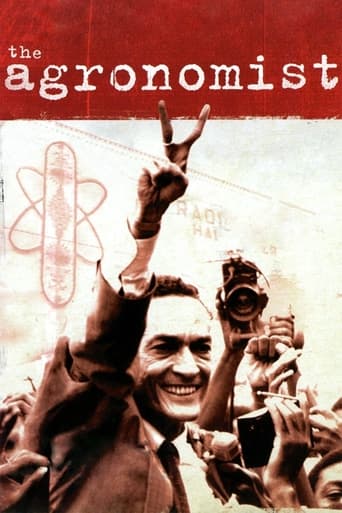ThiefHott
Too much of everything
Limerculer
A waste of 90 minutes of my life
Haven Kaycee
It is encouraging that the film ends so strongly.Otherwise, it wouldn't have been a particularly memorable film
Angeneer
This is one of the most inspiring documentaries I've ever seen. Jean Dominique's unparalleled quest for freedom really made my day and deepened my enormous respect for such idealists. His trademark smile was an invitation to join his struggle. His gestures, his talk, his manner, show an honest and strong man, who could not be bent. Only bullets could (and did) stop him.Another extremely touching aspect of his story is the level of bonding they had with his wife. It is such a rarity and such a wonderful thing to happen, that you cannot but feel happy that these two people have met and enjoyed their life together.As a documentary, it is flawlessly shot. The timing is right, each episode's duration is well calculated, it flows smoothly and it respects its material.Absolute must-see.
woozy
I spent quite a bit of time in Haiti when I was a child in the late sixties until the last time I went down there when I was in my early 20's, just after Baby Doc left the country. The memories are a combination of the most magical place on earth and the most tragic. I think many people who had contact with Haiti would say the same. The Agronomist is the story of a true Haitian hero and the ultimate price he paid for his passion to inform and enlighten the forgotten masses of people by running the only Creole radio station on the island. The tragedy is so many other well intention Haitians have paid the same price from a series of brutal dictators, who like usual have been supported and backed by other countries like the US and France (where you can see photos of Baby Doc on the ski slopes, while Jean-Bertrand Aristide got dropped in the middle of the Congo by our Compassionate Conservative idiots) The truth of the movie lies in fact then whenever there is a glimpse of hope some external events end up crushing it again and again. The film reminded me of my departed father, who had the guts to bring his family down to a magical place where its beauty is rivaled by its poverty. As a child I played in the streets with all the other children and blew any change I had on soda and chewing gum we would all share. You don't get that experience at Disneyland, thanks dad.
someguy889
The Agronomist, a documentary film by Johnathon Demme, director of Silence of the Lambs and Philadelphia, was made over the course of a decade in Demme's free time about the Haitian radio journalist. When Dominique was killed, this movie became about a martyr story for the people. Demme does a decent job with the confusing tale, but his documentary style might border on boring if it weren't for the astounding presence of Dominique himself. He is a wildly eccentric man, and very funny to watch, especially with his large white teeth and folding face. But you know while you're watching him that he's also very serious. This is at the same time a political movie and the study of an endlessly interesting man. It is a movie that sides with the Democratic, but to call it a Liberal movie is unfair, since the Democratic interests in Haiti are on a much different scale than those of America. Their interests were freedom, every day life. To them, Clinton was a chance for freedom and democracy, and I respect that. There are wonderful sequences such as when they talk about his love of film and agriculture. He was "an agronomist without any land." This is a moving picture that offers a lot of insight into the Haitian culture, and lets us see it through the eyes of this wonderful little man.My grade: 8/10
weissbud
One of the most important films of this era. A life lived with complete integrity and service to his community of the people of Haiti with passion and great courage. Everyone should see this movie and show it to their children as they enter adolescence. Dominigue is a model of courage whose life stood for something greater than his own personal agrandizement. He saw the greatness of each human spirit and brought that forward no matter the cost. Jonathan Demme had to know that Dominique's life was constantly in danger as he made the film and the film was made with the passion that Dominique himself would have sanctioned and in fact must have done so or the film could not have been made. I will own a copy of the DVD when it comes out to show to the young people I work with in the schools in the poorest areas of this New York City.

